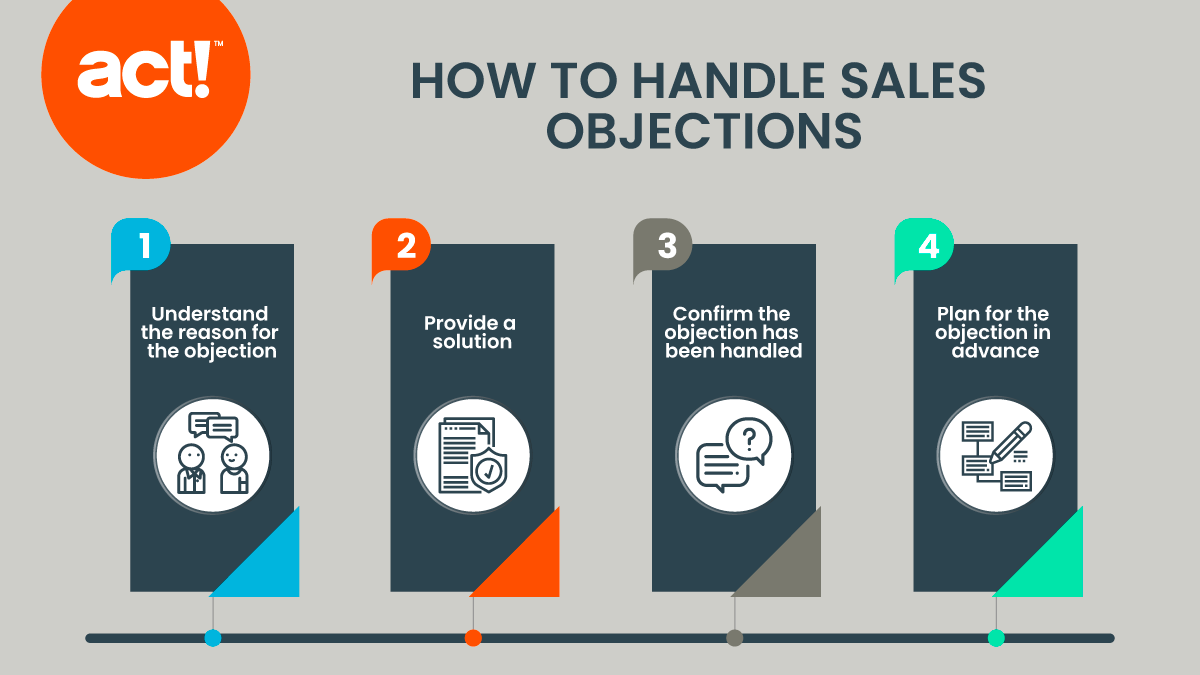In an ideal world, when you approach a potential customer about buying your product, they nod happily as you explain the benefits, agree the product is as great as you say it is, and stump up the cash you asked for.
Unfortunately, we don’t live in an ideal world.
Instead, throughout the selling process, you are likely to come across objections. This may be in relation to how much you are charging, the product itself, or simply that the buyer doesn’t want to talk to you.
Whatever the objection, you and your team will only make a sale if you are able to overcome it.
In this article, we’ll look at some common issues you’re likely to come across while selling, as well as objection handling techniques you can use to get past them.
Sales Objection Definition
A sales objection is a reason a lead has for not buying your product. However, it doesn’t mean they won’t ever do so. Receiving an objection can be a positive thing; it means you know what the buyer’s issue is and presents you with an
opportunity to overcome the problem.
An example of an objection could be a lead telling the salesperson that they don’t understand how the product will add value to their business. The sales rep could overcome the issue by showing how similar companies have received value from the product.
It’s important not to get too down about sales objections. Instead, think of them as a chance to learn more about your lead’s requirements and show them how your product is actually a great fit.
What are the Most Common Objections in Sales?
There are many potential objections a customer may have. However, some of the most common involve the price of the product, the product itself, or the situation the business is in.
Objections Related to the Price of Your Product
Anyone who has spent time working in sales is likely to have come across potential customers who object to the price of the product they are selling.
While price objections may seem like a simple issue, there are different reasons a lead may have for not liking the price you are quoting. Some of them include:
- The lead doesn’t have the money available at that time.
- The lead has enough money to pay for the product but doesn’t think it offers enough value.
- The lead can afford the product, but it costs more than seemingly similar solutions.
Overcoming these price-related objections will first depend on which one you are facing.
If it’s the first one, sales reps can attempt to set up a meeting at a later date, perhaps in the new financial year when budgets aren’t as tight.
The second and third objection can be overcome by showing the value of the product they are selling, either in relation to the cost of the product or in relation to competing products.
Objections Related to the Product Itself
Product or service related objections are those where the buyer doesn’t like your product or doesn’t think it is a good fit for their company. Some common product related objections are:
- The lead doesn’t see why your product is useful.
- The lead sees how the product is useful but doesn’t think it’s a good fit for their company.
- The lead wants other features from the product.
Product related objections can be overcome. Reps should provide the lead with information about the benefits of the product and how it works. Companies can enable reps to sell by providing them with data about the buyer or sales materials that effectively show the value of the product.
Objections Related to the Decision Process
Often objections occur because the contact isn’t ready to make a decision on the new product. This is understandable. However, it is an objection that can be overcome. Here are some common decision-related objections:
- The lead isn’t authorised to make the buying decision.
- The lead needs to speak to other people before purchasing your product.
- The lead says they are too busy to make a decision now and that they’ll get back to you.
There is no one way to overcome decision related objections.
Sometimes, you’re just speaking to the wrong person, in which case you can ask to be passed to a decision-maker. Alternatively, you could set up a presentation to explain the benefits of the product to the whole team.
If the lead says they are too busy, explain that you won’t take up much of their time and try to set a more appropriate time to call.
Other Objections the Buyer May Have
The above examples are some of the most common objections your sales reps are likely to come across. However, there are plenty of others that may not fit into the above categories.
For example, the lead could be locked into a contract with another provider, or they may simply be happy with the way their company works.

How to Overcome Buyer Objections
Each company should have a good idea of the common objections it is likely to face. Because of this, it is best to put in place a strategy that relates to these specific objections. Here are some ideas for how to do that.
Understand the Reason for the Objection
The key to creating a plan for overcoming objections is to understand the issue in the first place.
When you face objections, encourage your reps to listen to the buyer. They can also ask questions to fully clarify the issue. By properly understanding the problem, it will be easier to create a strategy to overcome it.
Provide a Solution
Once you have a better understanding of the problem, offer solutions that specifically relate to that issue. For example, if a buyer is unsure of the product’s benefits, show them case studies of how it has helped other companies in the lead’s industry.
Confirm the Objection has Been Handled
Once they have provided their solution, reps should confirm with the potential buyer that the answer solved the issue. Sales reps can ask the buyers questions about the answer they provided, or ask if the lead would like more information about what was discussed.
Of course, the buyer may have more than one objection. If this is the case, repeat the above steps.
Plan for the Objection in Advance
To make overcoming objections easier, teams should have a strategy in place for the most common ones.
Ask experienced members of your sales team to share problems they have faced as well as how they were able to overcome them. Your team can then work together to create a list of objections as well as standardised responses they know will be effective.
While you’re never likely to cover every objection your team will face, the more situations you create a strategy for, the better prepared you’ll be.
Wrapping Up
All sales teams will face objections when selling. Not all objections can be overcome.
However, reps that acknowledge this and prepare for how they will overcome the objections that arise will put themselves in a good position to make sales.





